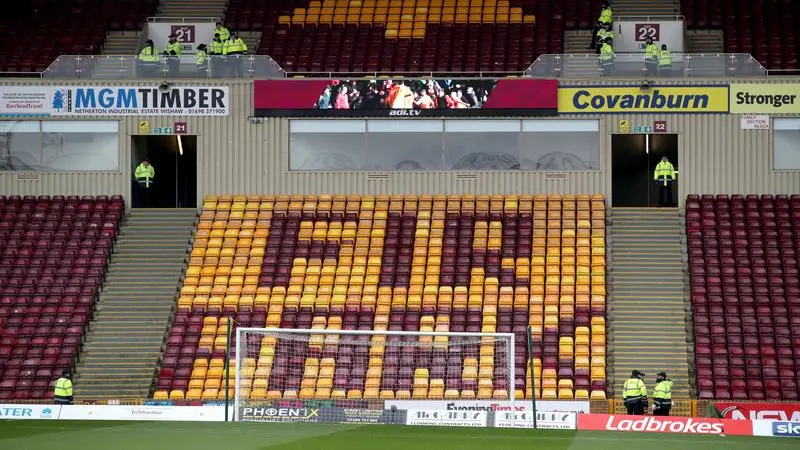The key questions answered as Motherwell reach agreement with American investor

Motherwell have reached an agreement with an American investor but the club’s majority shareholder has recommended that fans reject the proposal.
Supporters and shareholders are set to vote on the plan in the coming weeks.
Here, the PA news agency looks at the details behind the proposal.
Who owns Motherwell?

The fans. Through the Well Society, supporters own a 71 per cent stake, while the remainder of the shares are spread widely over a number of individuals. Well Society members have put in more than £2million while the group has attracted other donations worth more than £500,000. The society has committed about £1.1million into the club, mostly in the form of a loan and holds about £800,000 in cash reserves to protect the club from future financial harm.
Who are the American investors?
Have you ever entered an empty stadium? Try it. Stand in the middle of the field and listen. There is nothing less empty than an empty stadium. There is nothing less mute than stands bereft of spectators.
– Galeano pic.twitter.com/vP5uXSERAx
— Erik Barmack (@ebarmack) April 15, 2024
Los-Angeles-based Erik Barmack, a TV executive who used to work for Netflix and now owns his own production firm, Wild Sheep, and his wife Courtney, who works in social media. Barmack is a former journalist who was involved in the Drive to Survive documentary on Formula 1.
What is the deal?
The Barmacks would put in £1.95million over six years but immediately receive three seats on the board, including the chairmanship, in return for an initial £300,000 input. They would ultimately receive a 49 per cent share. The Well Society would have to commit to writing off half of its £868,000 loan to the club as well as contributing £1.35million over the six years, while seeing its stake cut to a maximum of 46 per cent, a total dependent on whether any smaller shareholders also subscribe.
Who is recommending the deal?
The Well Society Co-Chair, Douglas Dickie, will step down from the Society Board. Statement here: https://t.co/G2VO2wItdX pic.twitter.com/zHUFeooomw
— The Well Society (@TheWellSociety) June 10, 2024
The executive board, which is led by outgoing chairman Jim McMahon. The long-serving director launched a campaign aimed at the American market in January, saying the club needed investment to compete with the likes of Aberdeen, Hearts and Hibernian. The Well Society has two representatives on the board, Douglas Dickie and Tom Feely, while club chief executive Brian Caldwell and finance director David Lindsay both joined the board in recent weeks. However, Dickie has now stepped down from the Well Society board in the wake of the organisation’s statement.
Why is the Well Society board opposed to the deal?
An update from The Well Society Board relating to the Wild Sheep Sports proposed investment in Motherwell Football Club has been released and is available at https://t.co/Z9EHy8qTPE. pic.twitter.com/oIDL00K4Mg
— The Well Society (@TheWellSociety) June 10, 2024
A clear majority of board members have recommended members reject the deal for six main reasons. They say:
- The end of fan ownership would put the club at risk.
- The proposed investors would receive “disproportionate influence in the boardroom” for their initial £300,000 input.
- The deal undervalues the club at less than £4million.
- There is no logic or fairness in fans contributing a similar amount to the Barmacks while seeing their stake drop.
- Membership income and numbers could be drastically affected.
- A buyback option would commit the Well Society to paying more than £1million by 2026 to return to the status quo.
What are the Barmack plans?
They say their investment would “build long-term value” rather than going on signings. They claim their broadcast background could boost Motherwell’s “global visibility” and talked about a potential docuseries. They aim to “drive MFC into new frontiers in AI and social media”, see opportunities to bring in other investors and claim their links with other club owners could help extend the club’s international network.
What happens now?
A consultation period is under way ahead of the two-week ballot opening on July 1. The club’s financial situation is currently stable. The Well Society has close to £800,000 cash reserves while the club had recently predicted it would have £500,000 in the bank at the end of the recent season. Although the club have enjoyed two record profits during the fan ownership era and outspent Kilmarnock by on average £1million a season in staff costs in the first seven years, they have made a loss in recent campaigns after increasing the overall wage bill by 60 per cent over five years. The push for investment came amid a desire to provide further financial reserves, although the deal on the table suggests the new money will be spent on projects while the Well Society’s reserves are likely to go down.
